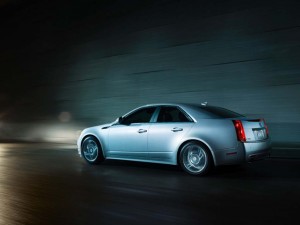It’s become something of a regular occurrence for manufacturers to issue so-called “stop sales” when they suspect a new model might have a problem that could lead to a recall. Volkswagen recently ordered one for its new Golf and GTI models, and General Motors has issued several this year, including one covering its popular Chevrolet Cruze sedan.
But GM has now issued another, more unusual stop sale, this one telling its dealers to park and sit on some older Cadillac models because of potential ignition switch problems. The order covers Caddy CTS models sold during the 2003 to 2013 model-years, as well as 2004 to 2006 Cadillac SRX sport-utility vehicles. A handful of 2014 Cadillac CTS models were also included.
The move, however, does not affect vehicles sold by non-GM dealers, whether franchised or independents, so shoppers need be aware that the vehicles have not yet been repaired and could be subject to problems until GM comes up with the appropriate fix.
The 554,000 Cadillacs covered by the June 30th recall are among a larger batch of vehicles that suffer from various ignition switch problems. They are not, however, part of the 2.6 million GM products included in a recall announced in February. That issue involves faulty ignition switches that could shift out of the On position inadvertently if the vehicles bounce over rough roads or have heavy weights on their key rings. In such an instance, the engine, power steering and brakes, and airbags may all shut off.
(VW issues stop sale for new Golf, GTI models. Click Here to find out why.)
That recall has been linked to at least 13 deaths. It has prompted a series of Congressional investigations, as well as a Justice Department probe, and it has led GM to initiate a victims’ compensation fund that could eventually pay out $1 billion or more, observers believe, to those killed or injured due to the defect.
But GM has announced a number of other switch-related recalls since then. In most of these instances, the problem is officially labelled as “unintended ignition key rotation.” The problem is not with the switch itself but rather the ignition key. It’s design is such that a motorist can inadvertently bump the key or the key ring and that may shift it from Run to the Accessory position.
If that happens, however, the same thing might happen as with the February recall, the engine, power brakes and steering, and airbags all being disabled.
(GM’s top attorney called “incompetent” as senators blast him for handling of ignition switch recall. Click Here for more.)
According to a letter GM sent to the National Highway Traffic Safety Administration, the Cadillac recall and stop sale only cover vehicles using key, rather than keyless, ignitions. That includes just 258 CTS models sold during the 2014 model-year.
The reason for the stop sale is that GM says it has yet to deliver dealers a suitable fix for the Cadillac models. It wants dealers to hold those vehicles until they can begin to make repairs.
Both GM and its dealers have been struggling to deal with the depth and breadth of the company’s recall issues – which impacted nearly 26 million vehicles during the first half of 2014. As TheDetroitBureau.com reported last week, GM has so far been able to complete repairs on only about 20% of the vehicles covered by the original defective ignition switch problem and doesn’t expect to complete the recall until October.
(For the latest on that recall, Click Here.)
the recall is another blow to Cadillac’s prestige and to GM’s expectations for the CTS, which has gotten good reviews but has struggled to catch on with buyers. The problems with the CTS have left Cadillac struggling for sales in the U.S.where the market for luxury vehicles is extremely competitive.
The Cadillac stop-sale order underscores a problem consumers face at a time of increased scrutiny on automotive safety. There are no laws requiring dealers to stop selling vehicles that have been recalled but not repaired. And a bill that would stop rental car companies from continuing to use such vehicles in their fleets has been stalled in the Senate – though all the major rental firms have pledged to voluntarily stop using such products.
So far this year, automakers have recalled about 42 million vehicles in the U.S. market, a new record exceeding the previous peak of 34.1 million set in 2004.
(Joe Szczesny contributed to this report.)

